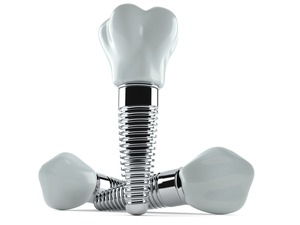Dental Implants or Natural Teeth: Which are Stronger?
September 5, 2025

It’s often said that dental implants are the next best thing to real teeth. Not only are they highly lifelike, but they also offer better stability and longevity compared to other tooth replacement options. But how do they stack up against your natural teeth? Could they be just as strong, or even stronger? Here’s what you can typically expect from dental implants in terms of overall strength.
What Exactly are Dental Implants?
Dental implants are small, screwlike posts that are normally made out of titanium. When placed in the jaw, the implant posts can form a lasting bond with the bone around them thanks to a natural process called osseointegration. This allows them to act as artificial tooth roots that can keep a crown, bridge, or denture firmly anchored in place. On top of that, the implant posts provide stimulation to the jaw, which is essential for preventing the bone loss that can occur when natural teeth are missing.
How Do Dental Implants Compare to Natural Teeth in Terms of Strength?
When answering this question, it’s important to note that strength can be measured in more than one way. For example, natural teeth come out on top in terms of biting and chewing power. Generally speaking, dental implants have around 80 to 90 percent of the bite strength of real teeth.
On the other hand, when it comes to durability, dental implants often prove to be the stronger option. Unlike your natural teeth, the implant posts are not made out of enamel, so they cannot get cavities. Additionally, titanium is a very hard metal that is less prone to damage than enamel and is far less susceptible to everyday wear and tear. Thanks to their durability, dental implants can potentially last the rest of your life, provided that you take good care of them.
Are Dental Implants Right for You?
It’s important to note that dental implants rely on the jawbone to provide them with strength and stability. As such, you can only be considered a candidate for dental implants if there’s currently a sufficient amount of bone tissue in your jaw. If your jawbone has already deteriorated as a consequence of your missing teeth, you may need to undergo bone grafting before you can qualify for dental implant surgery.
Your dentist can help determine whether dental implants truly are the right choice in your case. They’ll need to carefully examine your mouth and consider factors such as the state of your jawbone and your overall oral health before they can help you create a plan for replacing your missing teeth.
Remember, it’s always better to keep your natural teeth whenever possible. But if doing so simply isn’t an option, dental implants can offer a strong, long-lasting solution for the gaps in your smile.
About the Author
Dr. David M. Weinman went to the School of Dental Medicine at the University of Connecticut. He has completed a three-year program at NYU in dental implants, and he is a fellow of the International Congress of Oral Implantology. At his practice in Westfield, he is able to perform the entire dental implant process under one roof. If you would like to schedule a dental implant consultation with Dr. Weinman, visit his website or call (908) 654-7200.
No Comments
No comments yet.
RSS feed for comments on this post.
Sorry, the comment form is closed at this time.
